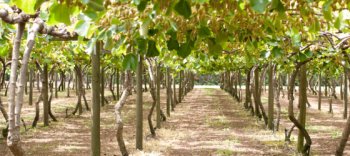
The CRI said that the project will enable a joint New Zealand-China team to support new research leadership from organisations in both countries, to begin working together on a new research programme aimed at identifying new sources of resistance to major kiwifruit pests and diseases around the world. This knowledge will be used by both countries to develop improved orchard management systems as well as fundamental knowledge that can be used to support breeding programmes working to develop future kiwifruit varieties with enhanced innate resistance to pests and diseases.
The devastating impact of Pseudomonas syringae pv. actinidiae (Psa) caused an estimated loss of $850 million in kiwifruit production in New Zealand alone.
“Plant & Food Research is a world leader in kiwifruit research, but it’s important that we work with other researchers in places like China to find out what might be present in wild kiwifruit,” said Research Leader, Dr Mirco Montefiori. “We have a large kiwifruit germplasm collection in New Zealand, but the diversity of kiwifruit vines in China is virtually endless.
“Better understanding of pest and disease threats such as Psa, how they spread and how plants develop natural resistance to them will provide valuable information to the New Zealand industry, increasing our resilience to possible threats in the future.”
The Catalyst Fund is administered by the Ministry of Business, Innovation and Employment and supports initiatives to strengthen international research collaborations and link New Zealand with world-class research projects, groups and infrastructure. The fund works to strengthen research collaborations with China in three priority areas: food safety and security, water research and non-communicable diseases.



 Classifieds
Classifieds

